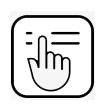
If you're experiencing any of these symptoms it is important to seek professional help as soon as possible in order to gain the understanding and support needed on your path to recovery.
Panic attacks can occur suddenly or in response to a trigger. They may be a sign of an underlying mental health issue, or may be caused by high stress. A panic attack will look differently for everyone, but common symptoms of one include:
Trembling
Feeling an overwhelming sense of fear
Having rapid heart rate
Shallow breathing
Sweating
Feeling faint or dizzy
Feeling disconnected
Nausea or other stomach discomfort
Chest pain
Tightness and a fear of impending doom

Generalized Anxiety Disorder (GAD)
Everyone will experience anxiety some times, but with Generalized Anxiety Disorder (GAD), that anxiety is near constant. GAD can result in panic attacks and persistent, excessive, and intrusive anxiety.

Obsessive-Compulsive Disorder (OCD)
Obsessive-compulsive disorder (OCD) is comprised of obsessions that cause anxiety and compulsions, which are behaviors that decrease the anxiety. Panic attacks often as a result of these distressing symptoms. Other symptoms can include:
Aggressive and unwanted opinions about other people or one's self
A need to have everything in a particular order
Counting things over and over again
Excessive washing or cleaning

Panic Attack Disorder
Panic Attack Disorder is a unique anxiety disorder in that panic attacks are the primary symptom. During this disorder, a person will experience sudden, unexpected panic attacks, seemingly out of nowhere. Other symptoms include:
Sudden and repeated panic attacks
The fear of a panic attack happening again
Fellig a loss of control
Avoiding places where panic attacks had occured in the past

Social Anxiety Disorder
Individuals diagnosed with social anxiety disorder (SAD) fight persistent and intense anxiety surrounding performance-based or social scenarios. The primary concern is of potential embarrassment, rejection, or scrutiny. Symptoms include:
Chest pain and tightness
Dizziness & dry mouth
Feelings of detachment from oneself
Heart pounding and racing (tachycardia)

Post-Traumatic Stress Disorder (PTSD)
Post-Traumatic Stress Disorder (PTSD) arises after a traumatic event. Trauma can leave long-lasting scars on our mental wellness, including panic attacks. Other symptoms include:
Vivid flashbacks & nightmares
Intrusive thoughts or images
Intense grief at real or symbolic reminders of the trauma
Physical sensations such as pain, sweating, nausea, or trembling

Specific Phobias
Unlike other forms of anxiety which are more general, specific phobias focus around an extreme and irrational fear of a specific object or situation. This phobia leads people to avoid their trigger at all costs, and confrontation often results in a panic attack. Other symptoms include:
Immediate feeling of intense fear when exposed to the source of your fear
Feeling powerless to control your thoughts
Doing everything possible to avoid the object or situation
Difficulty functioning normally because of your fear
Nurture your mental well-being through evidence-based approaches and treatments. Our therapists are here to guide you in creating healthier patterns of thinking and behavior, enabling you to effectively manage your symptoms.


855-722-4422

“Panic attacks are the body’s way of shouting that you are ignoring your mind and feelings.”

– Neo
Reaching out can be frightening. Our panic disorder therapists have created an inclusive space that is aimed to make you feel comfortable so you can reach your goals.

Find Your Therapist

Check Your Insurance

Schedule Your Session

The right panic disorder therapist will create a personalized treatment plan to address your unique needs and meet your mental health goals. You deserve the best mental health care there is, and we can provide that.
Online therapy for panic disorders is an effective way to treat your panic disorder from the convenience, comfort, and safety of your own home. Learn to understand your panic disorder, practice coping mechanisms, and receive the support you need at home.
Find Your Therapists Nearby
Our Therapists | Insurance | Services Offered | Privacy
Panic attacks can be caused by
This can lead to avoidance behavior and increased anxiety. It is important to seek professional help to develop a treatment plan that works for you. Or you can select your ideal therapist from our website, select a session time that works for you, and we'll reach out to you to confirm your appointment details.
Panic disorder treatment includes:
Cognitive-behavioral therapy (CBT)- CBT is a type of talk therapy that focuses on identifying and altering negative thought patterns and behaviors that contribute to panic attacks. Medication- Medications such as antidepressants, benzodiazepines, and beta-blockers are also used in treating panic disorder. Mindfulness techniques- Mindfulness techniques like meditation and deep breathing exercises can help to alleviate anxiety and improve overall well-being.
It's worth noting that every individual's experience with panic disorder is unique and a combination of treatments may be necessary to manage symptoms effectively, involving panic disorder medication. There is never a guaranteed "cure," but panic disorder therapy helps make positive lifestyle changes.
A therapist for panic attacks therapy uses various techniques to help individuals manage panic attacks, such as grounding techniques, cognitive restructuring, relaxation techniques, exposure therapy, and mindfulness techniques. Each technique is tailored to the individual, taking into account their unique experiences and needs. Whether online anxiety and panic attacks treatment therapy or offline therapy for panic attacks, at Lifebulb your therapist will help you with an individualized panic attack treatment plan to help you reach your specific goals.
The 333 method is a grounding technique used to manage anxiety and panic attacks therapy. It involves identifying three things, three sounds, and three parts of the body to focus on the present moment and reduce the intensity of a panic attack.
Panic attacks are sudden and intense episodes of fear or anxiety, characterized by rapid heart rate, shortness of breath, sweating or trembling, and feelings of impending doom or loss of control. If symptoms occur, seek help from a medical professional or mental health provider who may prescribe panic attack medication depending on the symptoms’ severity.
We believe getting access to a therapist or counselor should be quick and easy. So our process is straightforward. Simply browse our therapists' bios to find the right fit for you and schedule a virtual or in-person therapy session online. Or call our office, and a team member can help make sure you're matched with the right therapist or counselor for you and your goals. Whether online therapy for panic attacks or offline therapy for panic attacks, your therapist will help you with an individualized panic attack treatment plan to help you reach your specific goals.
At Lifebulb, we operate without any ongoing membership or fees. We believe that everyone deserves to receive the best online panic attack therapy service experience. And we believe those benefits should come free of any ongoing out-of-pocket fees simply for engaging in anxiety therapy. With us, your only session costs will be those set by your insurance provider or our low self-pay rate.
Therapists that don't enjoy their workplace are often, unfortunately, unable to provide their clients with the best possible level of counseling and therapy for panic attacks. That's why at Lifebulb, our therapists are our top priority. This means that your counselor or therapist can provide you, their client, with the best online therapy service because they enjoy the work they do in online anxiety counseling sessions with you, where they work, and who they work with.
Our online sessions of therapy for panic attacks are all conducted by our therapists in private spaces, and our video platform is contained within our HIPAA-compliant Electronic Health Records system, so your face, voice, and data are always private and protected. In doing so, we believe Lifebulb clients are best positioned to accomplish their therapy goals through in-person counseling or virtual therapy. Search online for ‘treatment centers for panic disorder,’ ‘panic attack treatment centers,’ ‘panic attack therapy near me,’ ‘panic attack treatment near me’ ‘panic disorder treatment centers,’ or ‘panic disorder treatment centers near me’ providing private virtual therapy sessions.
Although panic attacks can be terrifying and debilitating, there are ways to stop the cycle of panic attacks. Here are some panic attack treatment methods that could be useful:
Remember that it takes persistence and time to break the pattern of panic attacks. Keep your hope alive and be kind to yourself. You can even be prescribed the best medication for panic attacks and anxiety to manage symptoms.
Explore our resources to learn more about panic disorder treatment & panic attack medication.